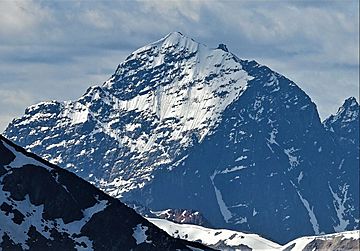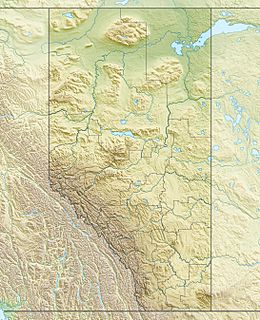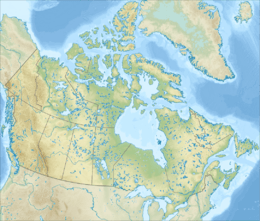Throne Mountain facts for kids
Quick facts for kids Throne Mountain |
|
|---|---|

Throne Mountain, north aspect
|
|
| Highest point | |
| Elevation | 3,120 m (10,240 ft) |
| Prominence | 880 m (2,890 ft) |
| Isolation | 5.02 km (3.12 mi) |
| Parent peak | Mount Edith Cavell (3,363 m) |
| Listing | Mountains of Alberta |
| Geography | |
| Location | Jasper National Park Alberta, Canada |
| Parent range | South Jasper Ranges Canadian Rockies |
| Topo map | NTS 83D/09 |
| Climbing | |
| First ascent | 1926 |
Throne Mountain is a tall and impressive mountain. It stands 3,120 meters (about 10,236 feet) high. You can find it in Jasper National Park in Alberta, Canada. This park is part of the amazing Canadian Rockies. The mountain is about 24 kilometers (15 miles) south of the town of Jasper. It is also 8 kilometers (5 miles) east of Tonquin Valley.
The mountain is made of different kinds of sedimentary rock. These rocks formed over millions of years. They were pushed up when huge forces shaped the Earth.
Contents
Mountain's Story
How Throne Mountain Got Its Name
Throne Mountain was named in 1916. A person named Morrison P. Bridgland gave it this name. He thought the mountain looked like a giant chair or a king's throne.
Morrison P. Bridgland was a Dominion Land Surveyor. This means he was a person who measured and mapped land for the government. He named many mountains in Jasper National Park and the Canadian Rockies.
First Climbers
The first time someone successfully climbed to the top of Throne Mountain was in 1926. The climbers were J. W. A. Hickson and Howard Palmer. They had a guide named J. Weber who helped them.
The name "Throne Mountain" was officially accepted in 1935. This was done by the Geographical Names Board of Canada.
Weather Around Throne Mountain
Climate Type
Throne Mountain has a subarctic climate. This means it has very cold and snowy winters. The summers are usually mild, not too hot.
Temperatures and Water
In winter, temperatures can drop very low. They can go below -20 degrees Celsius (-4 degrees Fahrenheit). With the wind, it can feel even colder, sometimes below -30 degrees Celsius (-22 degrees Fahrenheit).
All the rain and melting snow from Throne Mountain flows into the Astoria River. From there, the water goes into the larger Athabasca River.
 | James Van Der Zee |
 | Alma Thomas |
 | Ellis Wilson |
 | Margaret Taylor-Burroughs |



